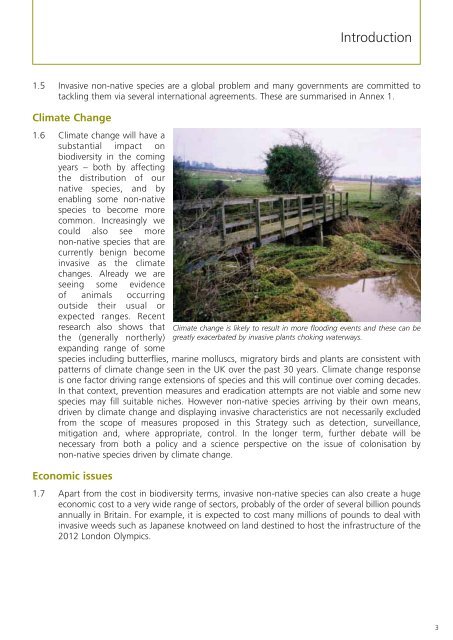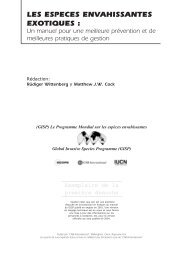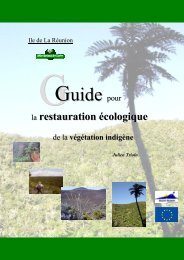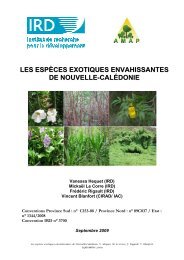The Invasive Non-Native Species Framework Strategy for ... - Defra
The Invasive Non-Native Species Framework Strategy for ... - Defra
The Invasive Non-Native Species Framework Strategy for ... - Defra
Create successful ePaper yourself
Turn your PDF publications into a flip-book with our unique Google optimized e-Paper software.
Introduction<br />
1.5 <strong>Invasive</strong> non-native species are a global problem and many governments are committed to<br />
tackling them via several international agreements. <strong>The</strong>se are summarised in Annex 1.<br />
Climate Change<br />
1.6 Climate change will have a<br />
substantial impact on<br />
biodiversity in the coming<br />
years – both by affecting<br />
the distribution of our<br />
native species, and by<br />
enabling some non-native<br />
species to become more<br />
common. Increasingly we<br />
could also see more<br />
non-native species that are<br />
currently benign become<br />
invasive as the climate<br />
changes. Already we are<br />
seeing some evidence<br />
of animals occurring<br />
outside their usual or<br />
expected ranges. Recent<br />
research also shows that<br />
the (generally northerly)<br />
expanding range of some<br />
species including butterflies, marine molluscs, migratory birds and plants are consistent with<br />
patterns of climate change seen in the UK over the past 30 years. Climate change response<br />
is one factor driving range extensions of species and this will continue over coming decades.<br />
In that context, prevention measures and eradication attempts are not viable and some new<br />
species may fill suitable niches. However non-native species arriving by their own means,<br />
driven by climate change and displaying invasive characteristics are not necessarily excluded<br />
from the scope of measures proposed in this <strong>Strategy</strong> such as detection, surveillance,<br />
mitigation and, where appropriate, control. In the longer term, further debate will be<br />
necessary from both a policy and a science perspective on the issue of colonisation by<br />
non-native species driven by climate change.<br />
Economic issues<br />
Climate change is likely to result in more flooding events and these can be<br />
greatly exacerbated by invasive plants choking waterways.<br />
1.7 Apart from the cost in biodiversity terms, invasive non-native species can also create a huge<br />
economic cost to a very wide range of sectors, probably of the order of several billion pounds<br />
annually in Britain. For example, it is expected to cost many millions of pounds to deal with<br />
invasive weeds such as Japanese knotweed on land destined to host the infrastructure of the<br />
2012 London Olympics.<br />
3





